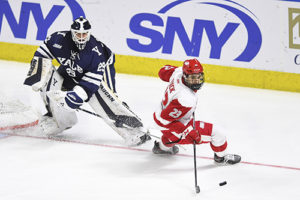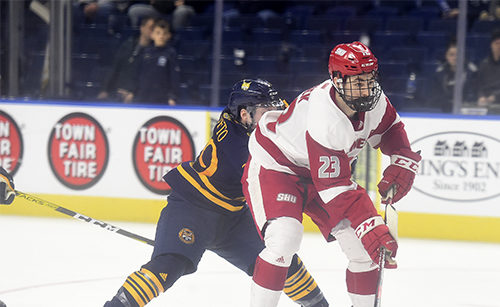Braeden Tuck, an alum of the Osoyoos Coyotes had a successful rookie season with the Sacred Heart University Pioneers, winning the Atlantic Hockey Rookie of the Year award.
Steve McLaughlin photos
Osoyoos Coyotes alum Braeden Tuck got an early opportunity to contribute to the Sacred Heart University Pioneers and ran with it.
Skating alongside Jason Cotton, who recently signed an NHL contract with the Carolina Hurricanes, and Matt Tugnutt, the son of former NHL goalie Ron Tugnutt, Tuck finished with five goals and 28 points in 34 games to win Atlantic Hockey’s Rookie of the Year.
“It was obviously pretty special. A nice little feather in the cap, but kind of weird how everything ended there with what is going on in the world right now,” says Tuck, who played the 2015-16 season with the Coyotes, winning the Kootenay International Junior Hockey League’s (KIJHL) Rookie of the Year. “I couldn’t have done it without my teammates and the coaches giving me an opportunity. Everything just kind of came together for me this year.”
The Pioneers website reported that Tuck led all freshmen in points and led the Atlantic Hockey Association in assists among rookies with 22. Tuck is also 10th in the nation in points per game among freshmen at .82 points per game and was also named to the All-Conference Rookie team this season.
Tuck, who is studying business, says he learned a lot from playing with great players such as Cotton and Tugnutt as well as his other teammates.
“I just feel like I developed a lot, learned a lot,” says Tuck, who also spent three years in the B.C Hockey League with the Trail Smoke Eaters. “It’s a pretty big jump from junior to college. Things were going well for the team and with team success comes individual success.”
Ken Law, the Kelowna Chiefs coach, who was Tuck’s coach with the Coyotes, sent him a congratulatory text. Law has followed Tuck’s progress since he made the jump to the Smoke Eaters.

“Players like Braeden Tuck don’t come along that often,” says Law. “I’m just glad I was able to work with him for the season he was in Osoyoos and I want to continue to follow his progress wherever it takes him.”
Law recruited Tuck after seeing him in Red Deer and says it was easy to see he was gifted and would do whatever it took to succeed. He added Tuck “was an absolute beauty to coach.”
“He would arrive at the rink for each day wanting to out work with everyone around him and to work on trying new skills every day,” recalls Law. “He was always the first one on the ice and last one off. He carried that same attitude in all team activities along with his schooling. It doesn’t surprise me at all he is having success as he would not settle for anything less.”
Transitioning from junior to college, Tuck noticed players are bigger, stronger and faster. The biggest difference he has seen is in system play and where players need to be positioned.
“At all times you have to be thinking, where do I need to be. Even small things – where your stick needs to be. It could be a difference of two or three feet,” he says. “The structure and the details in college are magnified that much more compared to junior.”
Tuck credits his lone season in the KIJHL for being huge in his success. Facing older competition taught him how to play against men.
“It was just a really great stepping stone for me to learn a lot about the game and how to play against older guys,” he says. “That was something I learned to do this year – find a way to have success against bigger, older, stronger players.”
Tuck says the KIJHL is a great development league. When he played, he was five-foot-11, 150 pounds and had to use his hockey sense to be successful in the physical league. He says the KIJHL is a bit under respected as a development league, but added younger guys get an opportunity to move to junior A or move onto school.


























